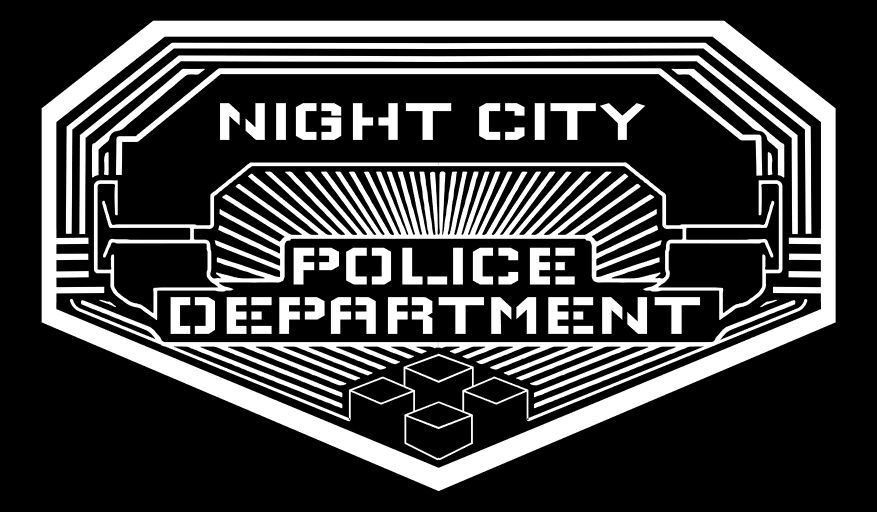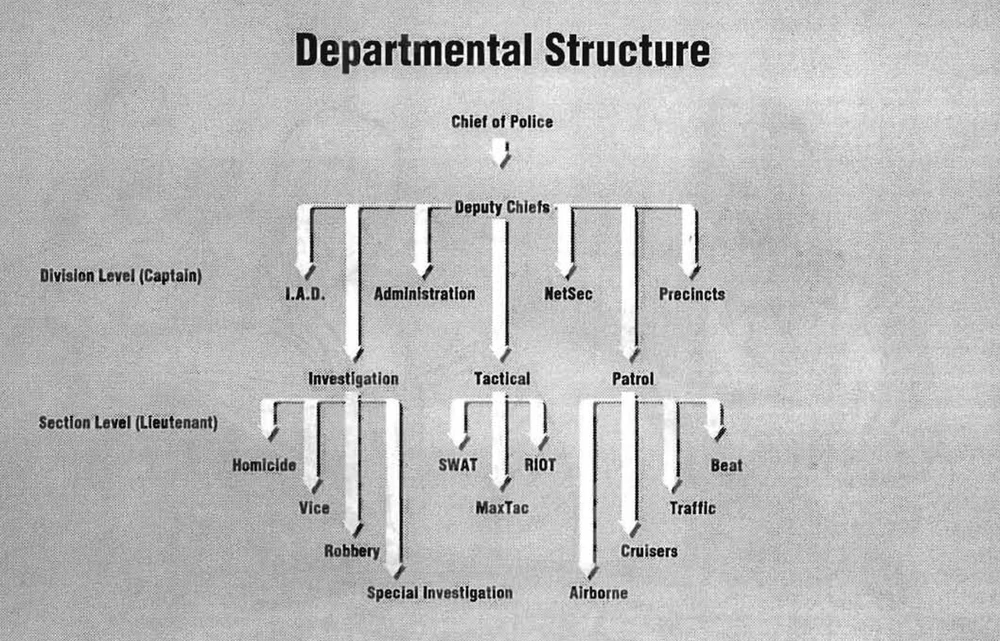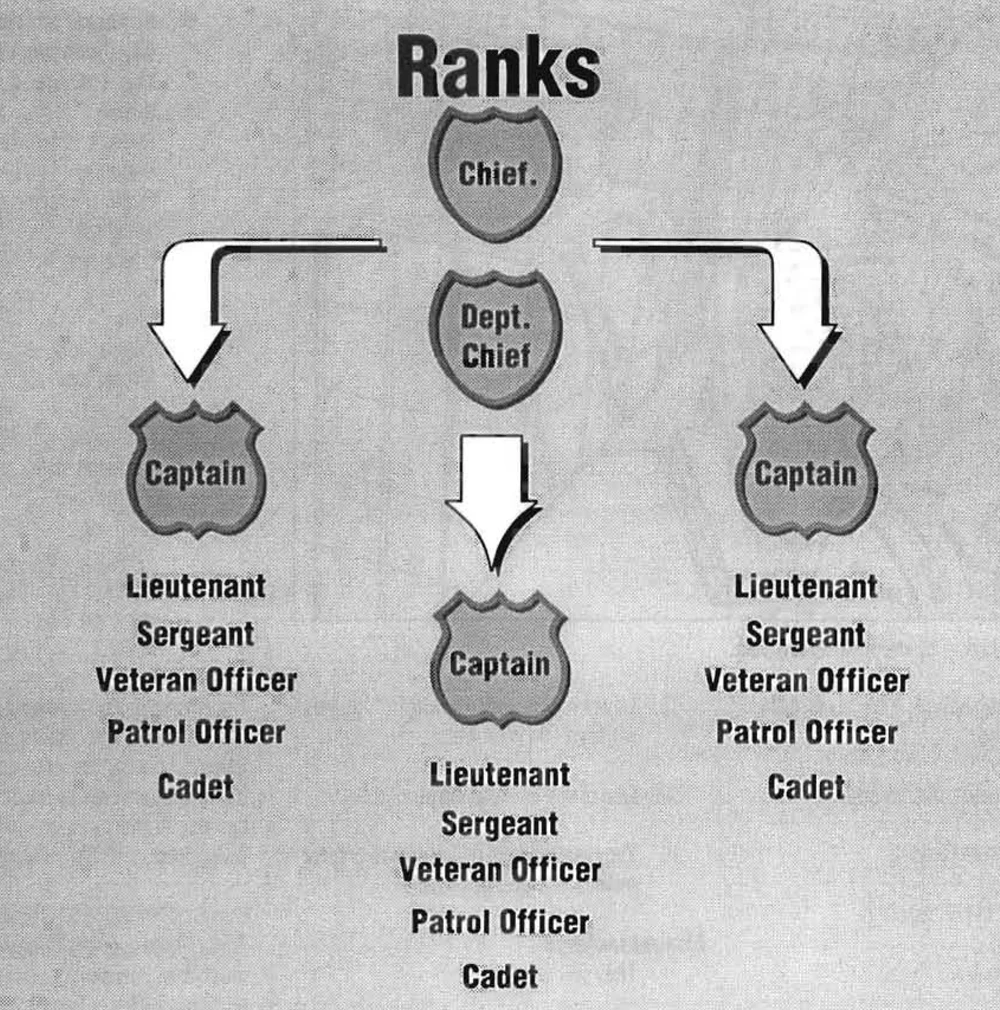NCPD
The Night City Police Department (NCPD) operates as the primary law enforcement agency within the chaotic urban sprawl of Night City. Despite being heavily privatized and facing immense challenges from rampant crime, powerful corporations, and a general atmosphere of lawlessness, the NCPD endeavors to maintain some semblance of order, though its effectiveness varies drastically depending on the district and the nature of the crime. Corporate influence often dictates their priorities, pushing them to handle petty and violent crimes, gang activity, and riot control, while corporate-related offenses are often removed from their jurisdiction.
Structure
The Night City Police Department is composed of several key divisions, each with distinct responsibilities for maintaining order in the sprawling metropolis.
Patrol
The Patrol Division forms the core of the NCPD, serving as the largest and most fundamental unit. Its primary objective is to deploy officers across various sectors to enforce laws and combat the city's pervasive crime. The Night City government consistently allocates more resources and personnel to this division due to the inherently dangerous nature of the work and the escalating crime rates. Within Patrol, Beat Patrol officers are the frontline presence, patrolling their assigned areas. Once operating alone, they now work in pairs given the increased dangers, responding to threats ranging from gang violence and corporate shootouts to riots, drug-related incidents, cyberpsychos, and general public disturbances. They are expected to handle most incidents independently unless a situation demands additional specialized assistance. Traffic Patrol is considered the lowest rung within the division, often assigned as a form of punishment. Their main duty is to enforce traffic laws and manage the flow of traffic, a role that earns them little popularity from both civilians and other officers. Cruiser Patrol represents an upgrade from beat cops, with officers driving outfitted police vehicles, known as "black and whites." They typically support beat and traffic officers in their sector patrols, enjoying the relative comfort and protection of a vehicle, though the high profile of their cars makes them a larger target. Finally, Airborne Patrol provides aerial surveillance and rapid response using helicopters, gyros, and aerodynes. While equipped with advanced aircraft, they function primarily as a support branch, capable of reaching any location quickly. However, their limited numbers and high demand mean response times can be slow, with higher priority crimes always addressed first.Investigation
The Investigation Division, though smaller than Patrol, is considered a promotion. This department is responsible for all criminal investigations in Night City, with detectives frequently encountering the city's most brutal crimes. Due to the covert nature of their work, detectives rarely wear uniforms, and many regulations are relaxed. They are often provided with vehicles and specialized equipment, and direct contact with dangerous criminals is common. Despite not patrolling streets, these detectives are expected to possess an intimate knowledge of the city's layout and intricacies. Within Investigation, the Vice department specifically targets narcotics, focusing on trafficking, possession, and distribution, as well as prostitution, gambling, and Weapons offenses. A significant portion of their work involves undercover operations, with Vice officers sometimes spending months infiltrating dangerous gangs in the city's most volatile areas. They are typically equipped with cybernetics designed for infiltration and surveillance. The Robbery department handles all forms of theft, including armed robbery, burglary, auto theft, grand larceny, fraud, counterfeiting, and embezzlement. This department receives substantial funding and resources due to its focus on high-value crimes. Members spend much of their time on paperwork, though some undertake undercover assignments when high-value heists are suspected. They are frequently seen rushing to robbery scenes, weapons drawn, to confront perpetrators. Homicide detectives deal with a wide range of cases, from mass murders to aggravated assault and the ever-present corporate killings. Night City's Homicide detectives can face up to 50 murder cases in a single day, leading many to become emotionally detached or develop psychological issues. The increasing violence from gangs, crime syndicates, and corporations keeps Homicide extremely busy, and a significant number of crimes often go unpunished due to a lack of evidence. The Special Investigations unit, also known as S.IN., tackles large-scale and severe crimes that often involve multiple departments or even other law enforcement divisions. Their purview includes mass murder, corporate espionage, widespread organized crime, high-profile kidnappings, and counterfeiting. They also take over shocking or brutal murders when other departments struggle to solve them. Other police divisions often resent S.IN. due to their larger budgets and their tendency to take complete control of ongoing cases.Tactical
The Tactical Division is deployed when negotiation is no longer an option, a frequent occurrence in Night City. They specialize in high-risk situations such as hostage rescue, riot control, and confronting cyberpsychos. Their officers are trained in all types of Situational Response, including anti-terrorism and urban clearance operations, and are outfitted with the best Gear and vehicles available to the police department. The critical nature of their work means that if they fail to resolve a situation, it becomes a problem for the entire city. Within Tactical, S.W.A.T. (Special Weapons and Tactics) units are rapid response teams specifically trained for high-risk scenarios and heavy weapon engagements. These teams consist of ten highly trained and well-equipped members, typically utilizing custom tactical police vehicles and carrying as many combat-oriented cybernetics as they can handle. SWAT officers primarily handle hostage rescues, heavily armed shootouts, sieges, and providing security for high-profile targets. MaxTac, or MAX-TAC, is Night City's C-SWAT team, a step above regular SWAT units. Their Special Purpose Assault Rescue (SPAR) units primarily deal with cyberpsychos and the most dangerous crimes in the city. The Riot team is on-call 24/7 and serves as the non-lethal counterpart to SWAT. They are trained in non-lethal crowd control procedures, though incidents and injuries have been known to occur. They are known for their ability to seal off entire city blocks to effectively disperse rioters, operating under the NCPD's policy that if one wishes to avoid harm, they should not riot.NetSec
The Net Security Division (NetSec or NETSEC) provides enforcement, monitoring, and information services related to The Net within Night City. While their main priority is to track down the most dangerous and audacious criminal netrunners, they also supply other police sections with up-to-date information directly from the Net. Not all municipalities possess a NETSEC, with many relying on Netwatch, the International Net Security organization. Beyond monitoring illegal netrunning, NETSEC also conducts its own information gathering runs, with NETSEC runners often providing crucial intelligence on suspects or corporations that can lead to convictions, revealing details about a suspect's affairs that traditional policing might miss. NETSEC officers tend to be highly strung and are unique in being allowed into the NCPD without formal Academy training. They monitor and recruit prospective operatives, deputizing them in a manner similar to CorpCops, granting them access to top-tier software and hardware to enhance their netrunning proficiency.Internal Affairs
The Internal Affairs Division (IAD) is often the bane of other police officers, tasked with investigating officers suspected of gross misconduct, corruption, dangerous behavior, abuse of position, or any activities that endanger the department. IAD officers are experienced investigators specifically selected for their ability to identify "bad" cops. They are generally disliked by other divisions due to their power to disrupt an officer's life based on mere suspicion of illicit involvement, potentially leading to suspension or worse, and creating a stigma among colleagues.Administration
Finally, the Administration Division (Admin Div) is primarily staffed by non-police personnel, such as secretaries and other desk workers, who handle the majority of the police department's administrative duties. While transfers to Admin are possible, they are generally undesirable unless an officer has experienced a significant trauma or suffered a serious injury, as Admin positions, unless at a very high level, offer little to no prestige among other officers.History
Following the conclusion of the Unification War in 2070, the Night City Government and several corporations attempted to revitalize a resort project in the Pacifica district. However, the existing local community, spearheaded by BARGHEST and the Voodoo Boys, resisted these efforts, viewing Pacifica as their home. Attempts by the NCPD to clear the area were met with weeks-long riots. Fearing a bloodbath, Chief of Police Ramos ordered a withdrawal from the most resistant areas. By 2072, an NCPD task force was expelled from Pacifica by Voodoo Boys-organized local groups, solidifying the gang's control over the western part of the district. Consequently, on October 17 of the same year, the Coastview precinct was officially disbanded by Deputy Commissioner Claudia Feldman with Mayor Lucius Rhyne's backing, effectively designating Pacifica a combat zone to contain the problem rather than solve it.
In 2076, Mayor Rhyne, deeming the NCPD unprofitable, moved to privatize the force. The former chief of police was replaced by Jerry Fawlter, a dataterm sales executive who prioritized profit. Fawlter drastically cut personnel, reduced patrols, and instructed officers to focus on issuing tickets over crime prevention. This reorganization also included a drones-for-cops program, a 5€$ per minute charge for 911 calls, and strengthened partnerships with private prisons. These changes led to a surge in Night City's crime rate, while private security services experienced exponential growth. By the end of 2076, the NCPD remained unprofitable and mired in debt.
By 2077, the NCPD rarely ventured into the Northside Industrial District of Watson due to rampant violence and criminal activity. Most city suburbs were also inadequately secured, with the thinly spread police force leaving security to local groups like 6th Street or corporate police. The Badlands, being outside city limits, were not patrolled, with private contractors authorized to use lethal force against suspicious individuals. The safest neighborhoods were City Center and Westbrook, while Heywood, and parts of Santo Domingo and Watson, ranged from moderately to highly dangerous. The NCPD maintained a threat level system to inform citizens about unsafe districts.
Around early to mid-2077, a 17% drop in the NCPD's capitalization from its January levels prompted the Mayor's Office to consider corporate security firms as an alternative solution to the "police problem." Commissioner Fawlter's appointment had left the police department outnumbered and often outgunned. Apathy and corruption permeated the force, with many officers losing faith in their thankless jobs and facing a high mortality rate due to their adherence to rules. Frustration stemming from powerlessness and overextension often led to brutality, aggression, and corruption among officers, resulting in negative public opinion. Despite this, a few officers still genuinely believed in protecting citizens and preventing chaos, viewing their badge as a symbol of protection and service. However, it was common for their partners or superiors to be unethical, favoring megacorporations who held the real power in Night City. Corporate-related crimes were increasingly removed from police jurisdiction, leaving officers to deal with petty crimes, murders, riot control, and gang activity.
Despite being underfunded and understaffed, the NCPD in 2077 still possessed the resources of a small army, including armored vehicles, AVs, and various weaponry. Willing officers posed a significant threat to gangoons, leading to arrests or executions for non-compliance. MaxTac, the NCPD's militarized force, remained one of Night City's most dangerous organizations, with its funding prioritized due to its visibility and public relations benefits. However, this cyberpsycho-specialized unit showed no aversion to collateral damage as long as objectives were achieved. Night Corp was a major sponsor of the NCPD around this time, with other significant corporations like Militech and Arasaka also investing in the department with expectations of reciprocity. When officers encountered difficulties due to corporations, politicians, or gangs, they often recruited mercenaries to assist in investigations, particularly outside their jurisdiction. To enhance effectiveness and reduce officer mortality, the department had petitioned the Night City Council over the years for increased legal authority and protections. As of 2077, NCPD officers possessed extreme procedural abilities, including the power to detain individuals for up to one year without charges, considering a shot to a limb as a warning rather than lethal force, firing upon vehicles that fail to stop immediately for traffic stops, and unofficially permitting collateral damage, including civilian deaths, when using lethal force to neutralize a cyberpsycho.






Comments